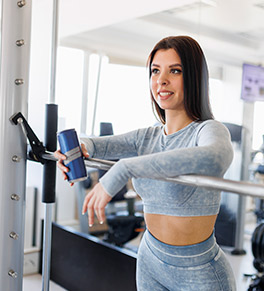Energy drinks: essential or excessive?

Energy drinks are a popular way to power up before a morning jog around the neighborhood or a busy day at work. But are they truly necessarily?
UCI Health sports medicine specialist Dr. Christopher Kroner doesn’t think so.
“Generally, energy drinks aren’t needed by the average person,” he says. “I would recommend they be used rarely, only in a pinch.”
Their high caffeine content can be cause for concern, adds Kroner, chief of UCI Health Sports Medicine Services. The average cup of coffee contains 95mg of caffeine, according to the United States Department of Agriculture. Many energy drinks have nearly twice that, close to 200mg.
Caffeine overload
“Getting all that stimulant at once can cause palpitations, anxiety, high blood pressure and trouble sleeping.”
Further, Kroner says needing more than a cup or two to get started each day is a sign that one has built up a tolerance and needs more to achieve the desired effect. It also may be a sign of dependence, that one cannot function without caffeine.
“In primary care, we consider one to two cups of coffee a day as not harmful. More than that can cause physiologic stress and do more harm than good.”
Better energy boosters
The primary benefit of such beverages ― alertness and energy ― are better attained by living a healthy lifestyle, says Kroner, an associate professor and vice chair of clinical affairs for the UCI School of Medicine’s Department of Family Medicine.
“Getting exercise, resting, drinking plenty of water and eating well every day can give a much bigger energy boost than caffeine, and in a much healthier way.”
Conversely, chronic stress, little sleep, poor eating habits and inactivity can contribute to a feeling of sluggishness, he says.
“If one finds they regularly need energy boosts, they are either addicted to caffeine or are exhausting themselves in other harmful ways.”
Explore Further
Browse more blog posts by topic.




